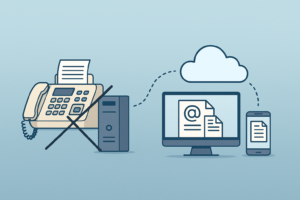The Internet may have revolutionized how the world communicates with itself, but it’s also changed how criminals take what isn’t theirs. Data breaches of sensitive information are happening in every sector, and industries are doing everything they can to stop cybercriminals in their tracks.
One of these efforts has come in the form of increased compliance standards. The transfer and storage of certain documents has become heavily regulated, no more so than within the health care industry. The Health Insurance Portability and Accountability Act was a law enacted in 1996 that places strict rules surrounding the privacy of patient information.
“The average medical record is worth about $363.”
Businesses operating within health care have to follow HIPAA very closely to avoid fines, and for good reason. Health care records are extremely popular on the black market due to the amount of personal information they contain. The average medical record is worth about $363, compared with the $154 average of all industries.
It is for this reason that HIPAA outlines some pretty strict punishments for those that violate patient privacy through the mishandling of sensitive medical documents.
The fines are steep…
Due to the sensitive nature of the average medical document, health care professionals are hit with hefty fines if they don’t comply with HIPAA. The American Medical Association has a chart on their site that spells out what a HIPAA violation can result in.
The chart states that even if you didn’t know you were infringing on HIPAA compliance regulations, you can still be held liable. The fine for someone who didn’t even realize they were breaking the law has a $100 fine minimum for every single violation. However, that’s just the bottom end. HIPAA violations can go much higher than that, with the maximum being a fine of $50,000 per violation.
Despite the fact that HIPAA outlines fines are not to exceed $1.5 million a year, that’s still quite a lot of money to lose on rules you didn’t even know you were supposed to follow.
 Violating HIPAA could very well empty your pockets.
Violating HIPAA could very well empty your pockets.…but they’re only the beginning
Although money is certainly something you need to be concerned about, it’s not the only consequence to consider when you violate HIPAA. If your violation leads to a breach in sensitive patient data, your facility’s reputation could very well take a huge hit.
A study conducted by the Ponemon Institute detailed just how hard it is to bounce back after a serious data breach of private information. The report found that an organization’s customer-facing reputation could plummet as far as 31 percent below what it previously was.
That’s a huge change in how your patients see your organization, but it makes sense considering the sensitive nature of certain medical records. Many health care documents contain embarrassing information about the patient, thereby becoming pressure points at which cybercriminals can squeeze. Patients aren’t going to look kindly upon the organization that allowed this private information to become public, and a lapse in secure document transfer could mean a huge dip in your facility’s reputation.
FoIP can help
Considering you can be fined for breaking rules you didn’t even know existed, and considering the fact that your facility’s reputation can be seriously damaged by a breach of patient information, your choice in document transfer is absolutely crucial. Faxing works perfectly well for meeting compliance, as it offers a level of security that few other modes of communication offer. That being said, using a fax machine alone is slow and inconvenient.
This is where faxing over IP comes in. FoIP is one of those amazing services that combines the advantages of two distinctly separate technologies into one incredible package. FoIP allows you to take advantage of HIPAA compliant cloud fax services, with which you can send documents securely, thereby making meeting compliance a breeze.
Enhance enterprise communication, collaboration and compliance efforts with a proven FoIP solution from FaxCore. Contact FaxCore today to learn more about their HIPAA compliant, ‘Partly-Cloudy’ fax solutions.




